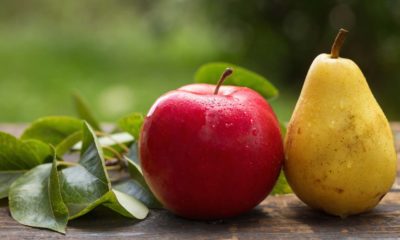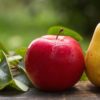Nutrition
Herbal Healing
Health journalist Siski Green investigates the benefits of herbs. Are they all they’re cracked up to be?
Plants provide seemingly magical benefits, it’s a fact. You’ll know this if you’ve ever sniffed eucalyptus oil when your nose is stuffy – like inhaling fairy dust, within seconds you can say ‘got a stuffy nose’ without problem.
Similarly, we take the magical powers of some plants so for granted we tend to forget they’re plants – your favorite pick-me-up, caffeine, for example. Then there’s aspirin, codeine, morphine, all derived from plants.
Now, however, there is a constant trickle of ‘new’ plant extracts or herbal remedies arriving on the healthcare scene. Some of these have been used for centuries in other cultures, others have only recently been discovered in far-flung parts of the world.
Because of this trickle, not all herbs have been thoroughly researched so we don’t yet know exactly how effective or how safe they are. Which is why we’ve looked at some of the most commonly used herbs that really do work and also some new ‘superstars’ to the scene, along with the risks associated with taking these natural alternatives.
CHECK THE SOURCE
Herbal remedies or supplements often aren’t produced or packaged in your home country. And the problem is that depending on where they come from, they may not meet the same stringent safety standards that other medicines do. A report from scientists at Baylor College of Medicine recently warned of the risks of herbal remedies, calling them a ‘global health hazard’ because of the possible carcinogens or heavy metals and other toxic substances that they may contain. How likely the supplements are to contain toxins depends on where they’ve come from.
Some countries, such as China, for example, have notoriously polluted soils – a BBC report estimated that one fifth of farmed land there is polluted with heavy metals – and so plants grown there might be heavier in toxins than elsewhere.
TO EXCESS
Another risk that most people don’t think about is simply overdoing it. You take a multivitamin, another multi-supplement, a herbal remedy that purports to help make you feel more alert etc and without realizing it, you’re ingesting risky amounts of one ingredient that’s contained in all of them, along with your diet. Vitamin A for example is often in multivitamins, but also often in supplements or herbal mixes intended to improve brain power.
Garlic supplements too, might be fine on their own, but if you’re taking anything for your heart or blood pressure, those supplements might have an unwanted effect. This innocent and healthy-seeming bulb has quite dramatic effects on your cardiovascular system. It raises high-density lipoproteins (HDL – the good one), and lowers low-density lipoproteins and triglycerides. That’s all great, but it also lowers blood pressure. So if you’re already someone with low blood pressure or if you’re taking meds to lower your blood pressure, adding garlic supplements to your diet could take it too far, endangering your health.
This is why it’s essential when taking any new medication, however innocuous it might seem, that you check with your doctor first.
HERBAL HYPE
Then there are the herbal remedies making claims that are unproven or simply false. Take all those herbal-based weight-loss teas for example. These might make you feel like you’re losing weight, but really all you’re doing is peeing and pooping more. Really.
Teas for weight loss and ‘flat tummies’ have been highly endorsed by celebrities and have become hugely popular. Not only is there no conclusive evidence to back up these health claims, a common ingredient called senna is used within the teas and acts as a laxative.
Senna can irritate the stomach lining and can cause cramps and diarrhea. For those suffering with IBS, senna can only exacerbate symptoms. If these teas are consumed in large quantities, they may even lead to a disruption with the body’s electrolyte balance which can cause heart problems in the long run.
In reality, all senna does is increase bowel movements which may leave people feeling slimmer and having a flatter stomach in the short term, but there is absolutely no impact on fat loss.
SURGICAL REPLACEMENTS
Similarly, there are several herbs touted online with claims they increase breast size – a nice idea if you’re on the small side but wouldn’t dream of cosmetic surgery and don’t want to take hormones because of the potential risks to your health long-term or simply because you’ve found hormonal supplements such as the pill make you gain weight or affect you psychologically.
And yet, when you investigate how these herbs work, they’re based doing exactly the same thing – boosting your hormone levels. Phyto-estrogens, phyto-progestins, for example, are plant-based versions of our own estrogen and progesterone. So while you might be trying to avoid messing with your hormone levels, taking a plant or herbal extract may well have the same effect. Be aware that herbs advertised as building more muscle are also mainly based on the same idea – boosting testosterone to increase muscle mass potential.
And, as with any substance that affects your body’s hormonal levels, there may be unwanted side-effects. Weight gain (or changes in where you gain or lose weight), changes in hair growth, and even your risk of certain cancers can go up if your hormone levels are disrupted. Which is why it’s essential you speak to your GP before taking any supplements that affect your hormones.
HERBAL HELPERS
You might be wondering whether it’s worth considering herbal remedies at all at this point – if they can be dangerous and possibly don’t even work, what’s the point? But there are some herbal supplements or remedies that can do wonders and they’ve been proven to do so.
Take rosemary, for example. This kitchen herb doesn’t just taste great on your roast lamb or potato soup, it can also genuinely help you remember things. A study from Northumbria University found that those who were exposed to the aroma of rosemary circulating in the air were able to remember tasks they had been set to do in the future, with an improvement of 60 and 75 percent, compared to others who breathed normal air. These findings, say the researchers, are consistent with other similar studies.
To enjoy the effect yourself, follow the same procedure as they undertook in the study: place four drops on an aroma stream fan diffuser and switch it on for five minutes before you sit down to write your to-do list, or whatever other thing you want to remember.
Then there’s milk thistle and dandelion root. These two plants, often yanked out of gardens for being weeds, might just help you protect your liver and along with that, your muscles. Around one in four young women binge drink, and the rest either drink regularly or occasionally (only a handful never drink at all), which means that most of us are playing havoc not just with our skin and livers, but also our ability to work out burn fat and build muscle.
Research funded by the Australian Sports Commission shows that drinking after exercise inhibits normal rates of muscle protein synthesis, which means all that grunting and sweating might come to nothing in terms of building that toned, fit body you’re after.
So, how can you get the alcohol out of your system as quickly as possible? The answer may be milk thistle or dandelion extract. Milk thistle has been touted for years as a way to protect your liver from damage, and more recently dandelion has also been promoted for the same reasons. Both are proven diuretics – which is a nice way of saying they make you pee a lot. That means your body can flush out the toxins quicker, but it also means you need to take care to drink even more water than usual. You’ll also need to check with your doctor if you’re taking other meds, as both milk thistle and dandelion root can interact with certain medications.
Ginseng, too, is a proven plant-based supplement – research published in the Journal of Translational Medicine found that it has significant anti-inflammatory effects, which in theory could help prevent muscle soreness after a workout, reduce your risk of heart disease and even skin flare ups. The research specified nine ginsenosides contained within ginseng and treated human immune cells with them, finding they promoted anti-inflammatory activity.
Then there’s camellia assamica, which when processed with very specific heating (very little compared to other teas) and rolling stages, produces white tea. White tea is the queen of teas, it seems, with more antioxidants than even green tea and other benefits too. Research from Kingston University, UK, found that white tea, along with several other plants, including bladderwrack, which also performed well in the studies, was found to inhibit enzyme activity responsible for breaking down elastin and collagen, the substances that keep your skin looking smooth and healthy.
Those same enzymes are associated with inflammatory diseases, too, such as rheumatoid arthritis. “We were surprised to find such high activity for the white tea extracts in all five tests that were conducted,” says Professor Declan Naughton, one of the lead study authors.
There are other herbs and plant-based extracts that help too. Research from Shaid Sadoughi University of Medical Sciences, Iran, has revealed that cumin can help with weight loss because it helps inhibit the absorption of cholesterol in the body (study participants took a teaspoon a day with yogurt); ginger has been proven to help prevent nausea and the symptoms of migraine; peppermint oil has been shown to be beneficial in treating the symptoms of IBS… and the list goes on.
THE BOTTOM LINE
Even within these ‘proven by science’ studies there’s always a limit and this is key: if any medication, supplement or treatment claims to give you miraculous results, chances are unfortunately, that it won’t. Miracle cures or ‘fixes’ simply don’t exist. Not only are there side-effects to consider, interactions with other medications and also your individual response to a substance, it’s impossible to know the effects of taking a substance long-term or in large amounts when there simply haven’t been studies to show they’re safe.
Your best approach is to investigate a new supplement or extract carefully – check the claims, look for research that backs up the claims (and check that the research has been published in a peer-reviewed journal, that the study included a large number of participants – more than 100, of various ages and gender – and talk to your GP too.
Finally, experiment with care – be aware how you feel and make a note of any changes. That way, if there are any unwanted side-effects, it’ll be easier for you to pinpoint the cause. Remember that while plants are natural, that doesn’t mean they’re necessarily safe.
Even plants that we eat can have toxic parts – the leaves of rhubarb and even those of tomatoes, for example, are toxic, while other plants such as belladonna and foxglove are highly toxic. Treat plant-based extracts and supplements with the same level of care that you would a man-made chemical and you can enjoy the benefits without putting your health at risk.






















